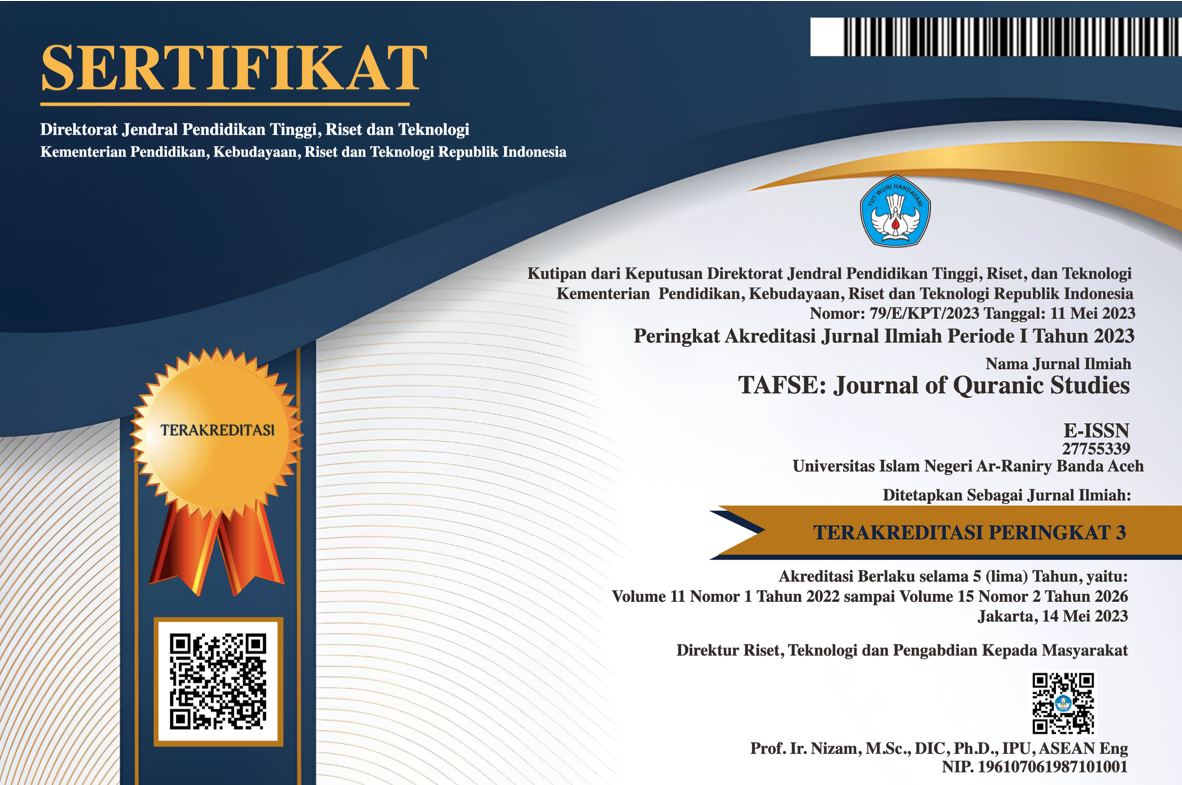A Comparative Analysis of Kartosuwiryo's Thoughts on Faith, Hijrah, and Jihad through the Lens of Tafsir Al-Azhar
DOI:
https://doi.org/10.22373/tafse.v9i1.23782Keywords:
Kartosuwiryo, Hamka, Faith, Hijrah, JihadAbstract
This study aims to examine and compare the ideological visions of Sekarmaji Marijan Kartosuwiryo with Hamka's interpretations in Tafsir Al-Azhar, particularly regarding the Islamic concepts of faith, migration (hijrah), and jihad, and their implications for the formation of an Islamic state in post-independence Indonesia. Employing a comparative analysis methodology and bibliographic research approach, this study collected and analyzed data from a variety of primary and secondary sources, including books, journal articles, and historical documentation. The analysis reveals fundamental differences between Kartosuwiryo, who advocates for the establishment of an Islamic state based on strict Sharia principles with a radical approach, and Hamka, who emphasizes the necessity of spiritual and moral transformation through hijrah and jihad. While Kartosuwiryo views hijrah and jihad as political tools for social and political restructuring, Hamka interprets these concepts as a spiritual journey supporting internal change and personal growth.
Downloads
References
Al-Chaidar. Pemikiran Politik Plokamator Negara Islam Indonesia, S.M. Kartosoewirjo. Jakarta: Darul Fallah, 1999.
Anisah. “Konsep Hijrah Sm Kartosuwiryo Dan Implementasinya Dalam Gerakan Di/Tii.” IAIN Syekh Nurjati Cirebon, n.d.
Azyumardi Azra. “Kartosuwiryo Dan NII: Kajian Ulang.” Studia Islamika 21, no. 1 (2014).
Buana, Cahya. “Nilai-Nilai Moralitas Dalam Syair Jahiliyah Karya Zuhair Ibnu Abi Sulma.” Buletin Al-Turas 23, no. 1 (2017). https://doi.org/10.15408/al-turas.v23i1.4803.
Dengel, Holk H. Darul Islam Dan Kartosuwiryo. Cet 1. Jakarta: PT Penebar Swadaya, 1995.
Fitriya, Intan, and Nailah Farah. “KONSEP IMAN, ISLAM DAN TAQWA.” Rausyan Fikr: Jurnal Studi Ilmu Ushuluddin Dan Filsafat 14, no. 2 (2019). https://doi.org/10.24239/rsy.v14i2.349.
Formichi, Chiara. Islam and the Making of the Nation: Kartosuwiryo Adn Political Islam in 20th Century Indonesia. Leiden: KITLV Press, 2012.
Hadi, Syofyan. “Negara Islam Indonesia: Konsepsi Shajarah Tayyibah Dalam Konstruk Negara Islam.” JOURNAL OF QUR’AN AND HADITH STUDIES 2, no. 1 (2013). https://doi.org/10.15408/quhas.v2i1.1309.
Hakim, Fauzan Manaanul. “Peranan Batalyon 306 Divisi Siliwangi Dalam Penumpasan Gerakan DI/TII DI Garut Tahun 1950-1962.” Universitas Negeri Yogyakarta, 2017.
Hamka. “Tafsir Al-Azhar,” n.d.
Handoko, Agus. “Konsep Jihad Dalam Perspektif Alquran (Studi Tematik Dalam Tafsir Al-Kasysyaf Atas Ayat-Ayat Jihad).” Mizan: Journal of Islamic Law 2, no. 2 (2018). https://doi.org/10.32507/mizan.v2i2.145.
Huda, M. Khoirul. “Mengenal Latar Belakang Negara Islam Indonesia (NII) Dan Penggagasnya.” BincangSyariah.Com, March 2021.
Husni, Husni. “Konsep Jihad Dalam Alquran Dan Aktualisasinya Dalam Pendidikan.” TAJDID 27, no. 1 (2021). https://doi.org/10.36667/tajdid.v27i1.489.
Ilham, Asep. “Pemikiran Keagamaan Sekarmadji Maridjan Kartosuwiryo 1927-1962.” UIN Sunan Gunung Djati Bandung, 2023.
Kulle, Haris, Naimatul Azizah, and Rizka Putri. “Hijrah Dalam Al-Qur’an.” AL ASAS 5, no. 2 (2020).
Lidyaningsih, Windy. “Dampak Gerakan Ditii Terhadap Kehidupan Sosial Keagamaan Masyarakat Desa Rajawetan Kecamatan Tonjong Kabupaten Brebes Tahun 1950-1960.” IAIN Purwokerto, 2021.
LPMQ. Asbabun Nuzul: Kronologi Dan Sebab Turun Wahyu Al-Qur’an. Jakarta: Lajnah Pentashihan Mushaf Al-Qur’an, 2017.
M. Quraish Shihab. Wawasan Al-Qur’an: Tafsir Tematik Atas Pelbagai Persoalan Umat. Bandung: MIzan, 1996.
Mubarak, M. Zaki. “DARI NII KE ISIS: Transformasi Ideologi Dan Gerakan Dalam Islam Radikal Di Indonesia Kontemporer.” Epistemé: Jurnal Pengembangan Ilmu Keislaman 10, no. 1 (2015). https://doi.org/10.21274/epis.2015.10.1.77-98.
Pinardi. Sekarmadji Maridjan Kartosoewirjo. Cet 1. Jakarta: Arya Guna, 1964.
Pramono, Slamet, and Saifullah Saifullah. “Pandangan Hamka Tentang Konsep Jihad Dalam Tafsir Al-Azhar.” Dialogia: Jurnal Studi Islam Dan Sosial 13, no. 2 (2015).
Ridlo, Miftakhur. “Negara Islam Indonesia Dan Kartosuwiryo (Konsepsi Gerakan Politik, Militer Dan Agama).” HUMANISTIKA : Jurnal Keislaman 5, no. 2 (2019).
Saepudin, Dindin Moh, and Izzah Faizah Siti Rusydati Solahudin, M. Khairani. “Iman Dan Amal Saleh Dalam Al-Qur’an (Studi Kajian Semantik).” Al-Bayan: Jurnal Studi Ilmu Al- Qur’an Dan Tafsir 2, no. 1 (2007). https://doi.org/10.15575/al-bayan.v2i1.1805.
Sanusi, Anwar, Anisah Anisah, and Didin Nurul Rosidin. “Hijrah and Islamic Movement in Indonesia: Sekarmaji Marijan Kartosuwiryo’s Perspective.” Buletin Al-Turas 28, no. 1 (2022). https://doi.org/10.15408/bat.v28i1.21486.
Sarina. “Sekarmadji Maridjan Kartosoewirjo (Studi Tentang Pembentukan Negara Islam Indonesia 1945-1962).” UIN Alauddin Makassar, 2018.
Waliyadin, Yana. “Politik Hijrah Sekarmaji Karto Suwiryo.” Jurnal Alwatzikhoebillah : Kajian Islam, Pendidikan, Ekonomi, Humaniora 4, no. 1 (2018).
Zuhaili, Wahbah. Tafsir Al-Munir : Aqidah,Syari’ah Dan Manhaj Jilid 5. Cet. 1. Depok: Gema Insani, 2016.
Downloads
Published
Issue
Section
License
Authors who publish with this journal agree to the following terms:
- Authors retain copyright and grant the journal right of first publication with the work simultaneously licensed under a Creative Commons Attribution License (CC BY NC 4.0) that allows others to share the work with an acknowledgment of the work's authorship and initial publication in this journal.
- Authors are able to enter into separate, additional contractual arrangements for the non-exclusive distribution of the journal's published version of the work (e.g., post it to an institutional repository or publish it in a book), with an acknowledgment of its initial publication in this journal.
- Authors are permitted and encouraged to post their work online (e.g., in institutional repositories or on their website) prior to and during the submission process, as it can lead to productive exchanges, as well as earlier and greater citation of published work (See The Effect of Open Access).





